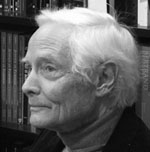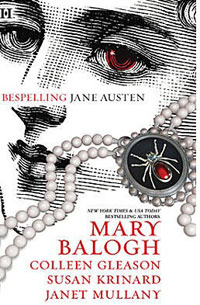W.S. Merwin: Poetry & What Can’t Be Expressed
 Last Friday night, Mrs. Beatrice and I had the pleasure of attending a New York Public Library event featuring W.S. Merwin, just a few days before his official appointment as the new U.S. Poet Laureate began. In a conversation with NYPL public programming director Paul Holdengräber, Merwin went all the way back to the beginning to discuss his love for language, starting with how he had learned to read when he was three (or maybe four?) from a book that had drawings of Native Americans living in the forests (which, back on the NYPL stage, soon got him to thinking about the lost lyric poetry of Native America). He got to thinking about poetry as “language about what cannot be said,” citing the notion that “the more one wants to express gratitude, the less adequate the words are,” and about poetry as an expression of the idea that whenever we look at something, we are seeing it both for the first time and the last time.
Last Friday night, Mrs. Beatrice and I had the pleasure of attending a New York Public Library event featuring W.S. Merwin, just a few days before his official appointment as the new U.S. Poet Laureate began. In a conversation with NYPL public programming director Paul Holdengräber, Merwin went all the way back to the beginning to discuss his love for language, starting with how he had learned to read when he was three (or maybe four?) from a book that had drawings of Native Americans living in the forests (which, back on the NYPL stage, soon got him to thinking about the lost lyric poetry of Native America). He got to thinking about poetry as “language about what cannot be said,” citing the notion that “the more one wants to express gratitude, the less adequate the words are,” and about poetry as an expression of the idea that whenever we look at something, we are seeing it both for the first time and the last time.
Holdengräber asked Merwin about the time when, as a young adult, he met with Ezra Pound at St. Elizabeth’s—”it wasn’t violent like Christopher Smart’s Bedlam would have been, but it was pretty weird”—and Merwin reflected that “we all owe [Pound] somethng enormous,” adding that every poet of his generation, upon reading Pound’s translation of “The River-Merchant’s Wife,” must have felt moved by the imagery and the language. Pound encouraged the young Merwin, who hadn’t yet acquired the life experiences to write meaningful poetry of his own, to work on translation, steering him towards the Provencal troubadors; years later, Merwin got another valuable bit of advice from Clarence Brown, who worked with him on putting the poems of Osip Mandelstam into English: “Don’t worry about it—no translation ever spoiled the original.” (Merwin also read a more recent translation, “Little Soul.)
Finally, Merwin talked a bit about his initial ambivalence towards the laureateship—”I’m not going to come to Washington and spend a lot of time wearing a suit and all that”—and why he finally decided to accept: “I’m horrified with our behavior towards the rest of life… denying global warming, at this point; I mean, honestly.” He hopes, through this public role, to be able to say: “Look, there’s another way of looking at the world… The feeling of being part of life itself is one of joy and elation.”
26 October 2010 | events |
Inject Some Horror into a Harlequin Romance
Earlier this week, romance novelist Janet Mullany came to Lady Jane’s Salon and read an excerpt from her new novel, Jane and the Damned, which is sort of like Abraham Lincoln, Vampire Hunter except that Jane Austen isn’t hunting the Damned, she’s joined their ranks, and together they’re fighting off French invaders.
 The scene she read was entertaining, so I’ll be interested to see how Mullany fares adding a paranormal twist to a modern retelling of Emma, which is the theme of a novella called “Little to Hex Her” that she’s contributed to a new anthology of supernatural-tinged, Austen-inspired stories called Bespelling Jane Austen. To celebrate its publication, Harlequin and Diesel eBook Store have launched a genre mash-up contest (watch out for the automatic audio file) where contestants take the plot summaries for novels like Whisper of Scandal and The Bride’s Bodyguard and load them up with monsters.
The scene she read was entertaining, so I’ll be interested to see how Mullany fares adding a paranormal twist to a modern retelling of Emma, which is the theme of a novella called “Little to Hex Her” that she’s contributed to a new anthology of supernatural-tinged, Austen-inspired stories called Bespelling Jane Austen. To celebrate its publication, Harlequin and Diesel eBook Store have launched a genre mash-up contest (watch out for the automatic audio file) where contestants take the plot summaries for novels like Whisper of Scandal and The Bride’s Bodyguard and load them up with monsters.
Each day the contest runs, Harlequin and Diesel will pick one semi-finalist to be featured on Diesel’s Facebook page; those fifteen entries will then be narrowed down to six by a jury that includes yours truly and Sarah Wendell of Smart Bitches, Trashy Books—and those six entries will be read in front of a live audience at a “mash-up meet-up” at The Brickyard (785 9th Avenue) on Thursday, October 28, which I’ll be emceeing. (The ultimate grand prize: The winner’s choice of a Kobo or Nook reader, both of which, non-coincidentally, Diesel has ebooks ready for you to purchase.) See the contest page for full details, and if you decide to come to the party, be sure to say hello!
7 October 2010 | events |

 Our Endless and Proper Work is my new book with Belt Publishing about starting (and sticking to) a productive writing practice.
Our Endless and Proper Work is my new book with Belt Publishing about starting (and sticking to) a productive writing practice. 
